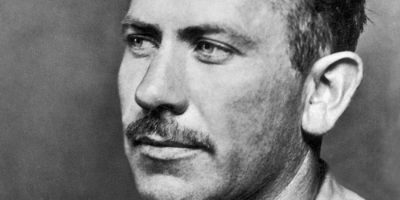Top 5 German Writers
Germany has been given the tag ‘country of poets and thinkers’. By 2009, the Nobel Peace Prize for Literature had been awarded to German authors thirteen times! This is a testament to the wealth in Germany in the form of its many celebrated writers. Below are the top 5 German writers that you will find interesting to learn about.
1. Johann Wolfgang von Goethe (1749-1832)
Johann Wolfgang von Goethe alias Germany’s Shakespeare is thought to be the greatest German literary personality of the modern era. He wore many hats; he was a poet, playwright, novelist, scientist, statesman, theatre director, critic, and amateur artist.
As a young man of 25 years of age, he had already accomplished what most writers take a while to do- he had made a name for himself as a writer after publishing ‘The Sorrows of Young Werther’, his first novel. The novel was a tragedy; an unhappy romantic infatuation that resulted in suicide. Goethe is mostly recognized for his poetry. One of his most renowned works is his drama ‘Faust’.
Goethe’s career path was seemingly charted by his father, who had him homeschooled and intended that he study law and become part of the city administration. Goethe did follow this path for a while and served as a statesman. He also practiced law but was a writer at heart with a passion for drawing. He additionally was a statesman and natural philosopher.
2. Hermann Hesse (1877-1962)
Hermann Hesse was awarded the Nobel Prize for Literature in 1946. Growing up Hesse wanted to be a poet. He published his first book, a collection of poems, in 1899 and his first novel in 1904. Hesse had the advantage of a repertoire of multicultural experiences and references for his writing as he had traveled and lived in Switzerland, India, and Germany. He also boasted both German and Russian citizenship by birth and later gained citizenship in Switzerland after a lengthy stay there.
Hesse’s books Siddhartha, The Glass Bead Game and Steppenwolf propelled him to recognition as a writer. Much of his work betrays his own relationship with German nationalism and also explores Indian and Chinese philosophies. Hesse was revered by the youth in the 1960s and 1970s, for his appeal for self- realization and his celebration of Eastern mysticism.
3. Christa Wolf (1929-2011)
Christa wrote in an era in which literature played an existential role in Germany which was divided then reunified. When Christa Wolf published Der geteilte Himmel (Divided Heaven, They Divided the Sky) in 1963, she got her breakthrough as a writer. The novel tells the love story of a young couple who separate when the wall goes up. In 1961, she published Moskauer Novelle (Moscow Novella).
Wolf broke bread at the table of politics and socialism as well; she was renowned for empowering people enabling them to be active in the industrial and patriarchal society by churning material that discussed political, economic, and scientific power. This was very timely as it came after World War II. As it might be expected, writing on politics and socialism did rub some people the wrong way. Wolf’s examination of the relationship between individual and socialist ideals in her novel ‘The Quest for Christa T’ was not well received. The book was denounced by the government. She was also criticized in the West for her lack of denunciation of the authoritarian rule of the German Democratic Republic.
4. Anna Seghers (1900-1983)
Anna Seghers’ 1932 novel, Die Gefährten got her arrested by the Gestapo, the official secret police of Nazi Germany. The novel warned of the dangers of Nazism. Her most famous novel ‘The Outing of the Dead Girls’ was written in Mexico, where she had fled to.
Influenced by the times in which she lived, Segers’ writing was mostly on the state of Germany and the moral conundrum that its people found themselves facing as they stayed complacent during World War II.
Seghers’ novel Die Gefährten which she published after joining the Communist party warned of the dangers of fascism. She additionally managed to put out one of the only published descriptions of what life was like in the concentration camps. She definitely had her hands full pre, during and post- World War II.
So what did it take for Anna Seghers to be a writer of such repute? And what propelled her towards the genre of writing that she put out? Seghers was born into a Jewish family and got married to a Hungarian Communist. She grew up as an only sickly child who found solace and company in books. Christian influences can be seen in her writing as she interacted with Christianity in school and amongst her peers. The author was cognizant of the changes that took place around her, courtesy of World War I, as she was growing up during this time. Seghers was highly cultured, well-read, and was interested in art. Upon her death, she received a state funeral.
5. Friedrich Schiller (1759-1805)
Like Johann Wolfgang von Goethe, Friedrich Schiller wore many hats- poet, philosopher, physician, historian and playwright. He has been said to be for Poetry what Beethoven was for music, a giant of the German classics.
His path as a writer however wasn’t straight forward. He was initially sent to the Military Academy as a young boy. He did study Law and later Medicine, holding down his first job as a medical officer.
Schiller is famous for his dramas such as Die Räuber, the Wallenstein trilogy, Maria Stuart, and Wilhelm Tell. His writing was influenced by his experiences growing up such as the regime of his day abusing power. Like most, some of his works that criticized leadership courted trouble for him. Schiller had to revise a play for the theatre stage as it apparently had rebellious vibes and needed toning down.
The author relied on favors from friends and outright financial assistance to survive at some points in his writers’ life. Johann Wolfgang von Goethe, an already established author was Schiller’s friend. This relationship was mutually beneficial for both writers. Goethe recommended Schiller for a professor of history position at the University of Jena. The two worked together on a collection of short satirical poems.
Schiller’s early writing was mostly attacks upon political oppression and the tyranny of social convention, while his later works focused on building the person- freedom of the soul that allows someone to rise above fatalities of the flesh and material needs and wants. Schiller clearly grew deeper with age and experience.
From political satire, poetry, plays, and more, these top 5 German writers will take you through a rollercoaster of Germany’s history and give you the German experience of life. A search through the works of each of the authors listed gives this variety.
Planning a trip to Paris ? Get ready !
These are Amazon’s best-selling travel products that you may need for coming to Paris.
Bookstore
- The best travel book : Rick Steves – Paris 2023 – Learn more here
- Fodor’s Paris 2024 – Learn more here
Travel Gear
- Venture Pal Lightweight Backpack – Learn more here
- Samsonite Winfield 2 28″ Luggage – Learn more here
- Swig Savvy’s Stainless Steel Insulated Water Bottle – Learn more here
Check Amazon’s best-seller list for the most popular travel accessories. We sometimes read this list just to find out what new travel products people are buying.















